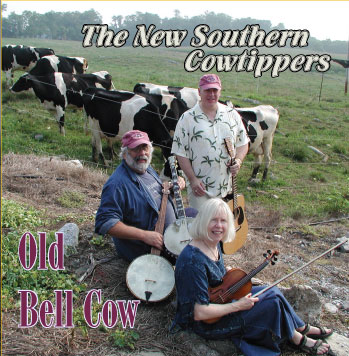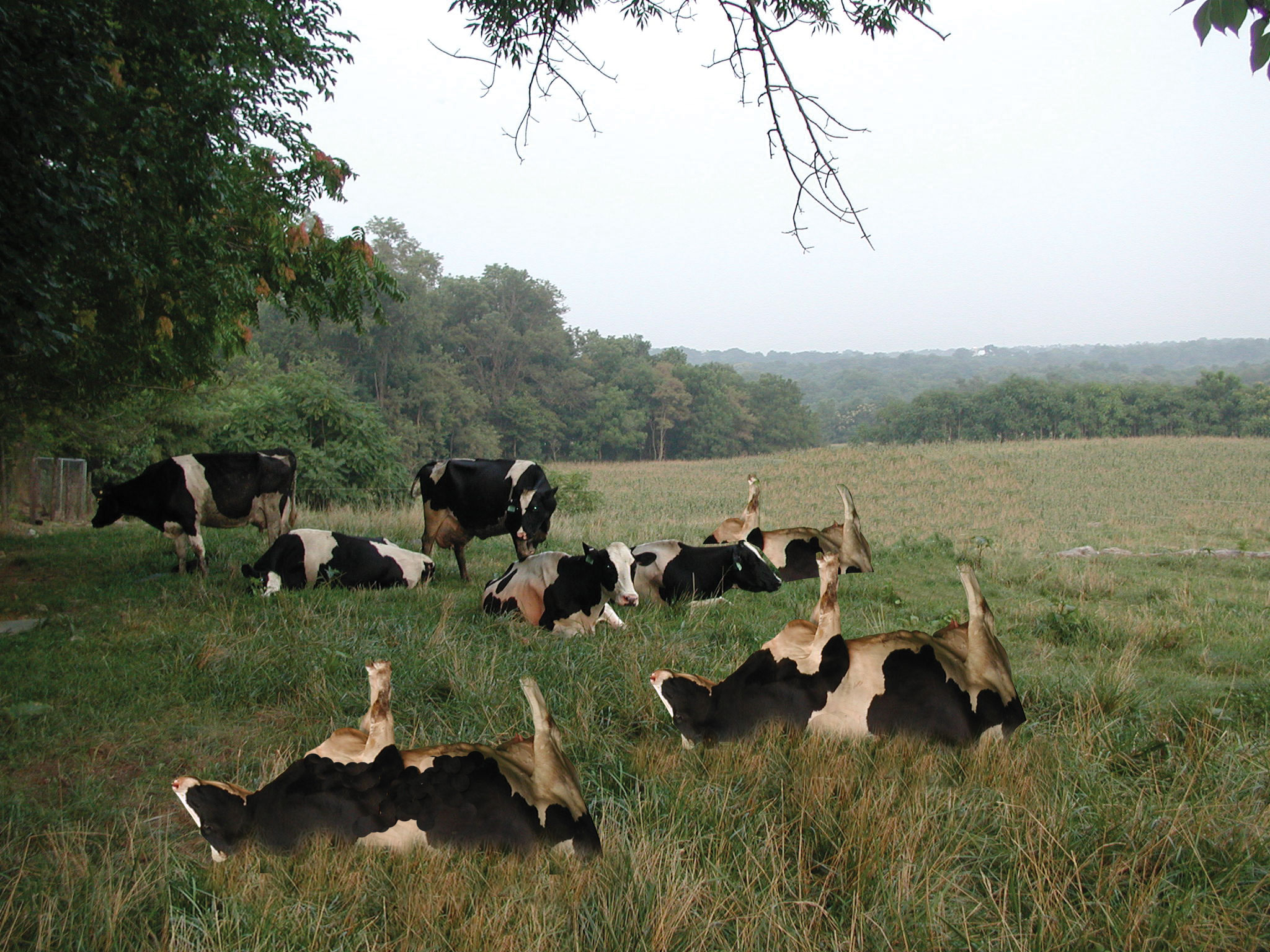 |
|||
| Track Information 1. Walk Along John
to Kansas (A): [Learned from Jerry Correll at Clifftop
2005; a.k.a. “Rabbit Where’s Your Mammy” (Phillips
Collection, Vol. 1) or “Heel Flies” (Marion Thede)] The
fiddle is cross-tuned in A (AEAE), as are all other A tunes. The banjo
is tuned to aEAC#E, as are all tunes played in A. Listen
to MP-3 Sample.
2. House of the Rising Sun (D): Jim sings this blues classic first recorded in the 1920s by black bluesman Texas Alexander and later covered by Leadbelly, Woody Guthrie, the Weavers, Peter, Paul & Mary, Dolly Parton, Bob Dylan, and the Animals. Jim learned it from the Double Decker String Band. Listen to MP-3 Sample. 3. Rebel Raid (G): [Kentucky fiddler W.H. Stepp (1875-1947) – AFS1573, B2] We heard this on a recording of the Possum Trot String Band (1970s) given us by Old Time Harold Maurer and fell in love with it. As did that group, we changed the phrasing in Part A to give it more drive. The banjo is a 1903 Fairbanks #7 (Whyte Laydie) tuned to gDGBD. All drop thumb clawhammer tunes are played with this banjo. 4. Old Bell Cow/Red Steer (A): [Old Bell Cow: words from New Lost City Ramblers; source, The Dixie Crackers, Paramount 31511; fiddle part inspired by Charlie Kinney, Lewis County, KY/Red Steer: Dyke’s Magic City Trio] 5. Tilden to the White House (G): [Alfred Bailey, Bath County KY] Samuel Tilden won the popular vote but Rutherford Hayes won the election of 1876. There is nothing new in the world! The banjo is a fretless civil war design by Bob Flesher and is tuned to dGDGA. Howard uses a very old thumb lead style he learned over 50 years ago and long forgotten, but rekindled by Bob Flesher. 6. Short Life of Trouble (C): [G.B. Grayson and Henry Whitter, recorded about 1928-30] Howard plays thumb lead on his Whyte Laydie, which sounds like two-finger picking. Howard says it should be “Long Life of Trouble,” that is, it is not long, it only feels that way. Sandy sings it from the female perspective. She loves the train verse, as Howard is a model railroader. The clicking is the sound of fingernails hitting the banjo rim, to simulate tastefully-played spoons. 7. Black Hairy Possum (really Blackberry Blossom) (G): [Fiddlin’ Arthur Smith, 1930] A few years back a fellow entered our campsite at Clifftop (Appalachian Stringband Festival) and seriously asked if we knew “Black Hairy Possum.” We offered to play “Crippled Creep” instead. 8. Crow Black Chicken (D): [Leake County Revelers, Mississippi string band, 1928] This is a good chicken tune! Sandy sings lead on verse, harmony on chorus. Jim sings lead on the chorus. 9. Paddy on Pennsylvania Turnpike/Dixie Hoedown (G) [Paddy on PA Turnpike: Sarah Armstrong, from Bayard’s “Hill Country Tunes,” Tune 31B as recorded on Todd Clewell’s CD, “Sarah Armstrong’s Tunes,” 2004/Dixie Hoedown: Jesse McReynolds, “Me and My Fiddles,” recorded 1988] Sandy had not played this for a number of years but was reminded of it a few years ago when she heard it played at Clifftop. Now it is one of our favorites. 10. Go ‘Long Mule (A): [Uncle Dave Macon, recorded 1927, from 1924 pop song by Creamer and King] Sandy loves the last verse. Politics were always part of Uncle Dave’s songs. Sandy sings lead, Jim harmony. 11. Sandy’s Walk (G): We heard this tune at the 2003 Clifftop Appalachian Stringband Festival as Sandy was returning from a walk to the outhouse. It was named by our friend Bill Locke of Pittsburgh. Part B reminds us of “Bitter Creek”, but part A is quite different. If anyone knows the name of the tune, let us know. Howard plays the fretless banjo. 12. Leaving Home (A): [Charlie Poole and the North Carolina Ramblers, 1926]. The old story of Frankie and Johnny with its tongue-twisting chorus sung by Jim at lightning speed. 13. Grandpa’s Hat (D): Learned from Nick Pappas, Kentucky ethnomusicologist at the 2004 Clifftop, WV, Appalachian Music Festival and credited to Jimmy Wheeler, Ohio fiddler. 14. Doodle Bug Song (G) [Georgia Yellow Hammers, 1927-30] Sandy sings lead, Jim harmony. Sing along on the chorus! 15. Hilltop Hornpipe/Icy Chicken (A): [Hilltop Hornpipe: Cyril Kines, Fauquier County, Virginia, late 1980s/Icy Chicken: Ward Jarvis, Ohio Fiddler, 1977. FRC 402 as “Icy Mountain”] Note … ”Icy Chicken” being sort of modal in A and G is really “Icy Mountain” Howard heard a great chicken story and this tune became a natural for the name. Years back, the British were testing their new high speed railway locomotives including the integrity of the windscreen. The Brits borrowed a bird cannon from our FAA and proceeded to fire dead chickens at the windshield as is done with aircraft. This tests its strength from bird strikes during take-offs, climb-outs, and landings. To everyone’s horror, the chickens smashed through the windscreen and almost penetrated the cab bulkhead. The FAA was summoned to help and after weeks of study made this recommendation to the Brits …”It would be best to thaw out the chickens.” Listen to MP-3 Sample. 16. Been All Around This World (D): [The Highwoods String Band] The banjo is tuned to aDADE as are all other clawhammer tunes in this key. This is a classic old-time song we love. Jim sings lead, Sandy harmony. 17. Grub Springs (A): [Mississippi fiddler, W.E. Claunch, from a Library of Congress recording] 18. Old Cow Crossing the Road (C): [Kelly Lundy, “The Lundy Family – Back in Galax Again,” Heritage Records, 1992 from Galax fiddler Herbert Higgins] We envision cows polka-ing across the road when we play this tune. 19. Diamond Joe (A) [First part — sort of — from Dwight Diller, second part from the Georgia Crackers, 1927] Jim sings lead; Sandy harmony. 20. Indian Et a Woodcock (D): [Kentucky/West Virginia fiddler, Ed Haley from Rounder 1131/1132 as “Indian Ate the Woodchuck”] We have been criticized for the poor grammar … ”Indian had eaten the woodcock????” Nah!!!!! The banjo is the 12’ pot civil war style fretless and tuned to dADF#A and played using the ancient thumb lead (not minstrel) style. 21. Courting the Girls from Baltimore (G): [Cyril Kines, Fauquier County, Virginia, mid-1980s] Sandy had learned the tune from Cy and, because we now live near Baltimore, worked the tune up for the Cowtippers.. 22. Gospel Plow (C): Banjo is tuned to gCGCD as are all other clawhammer tunes in this key. Jim and Howard learned this wonderful song from Dwight Diller. Sandy first heard it played by Jenes Cottrell on an old Kanawha album. 23. Black Widow Romp (D): Composed by Chris Romaine, used by permission obtained when the composer was in a good jam at Clifftop and could hardly say no. 24. Will There Be any Fiddlers Up There? (G): [McClendon Brothers, recorded September 28, 1938, in Rock Hill, SC on Montgomery Ward label] Sandy sings lead, Jim sings harmony. Howard plays his Whyte Laydie banjo using the thumb lead style. It sounds like two-finger picking. Listen to MP-3 Sample. Credits All tunes and songs traditional except Black Widow Romp by Chris Romaine. Used with permission. Recording, Mixing, and Graphics Design, Basement Music, Greencastle, PA. ©2006, The New Southern Cowtippers, 410-730-1036, hzane1@verizon.net No animals were harmed in the making of this CD.
|
|||
